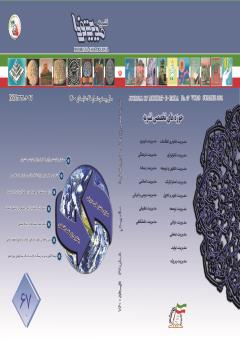Future Proofing Model of the Sustainable Water Resource Management based on the Scenario Planning Approach- Case Study: Golestan Province
Subject Areas :Seyed Mansour Rahim Hoseini 1 , Aliakbar Hasani 2 *
1 - Master of Business Administration, Faculty of Industrial Engineering and Management, Shahrood University of Technology, Shahrood, Iran
2 - Associate Professor, Faculty of Industrial Engineering and Management, Shahrood University of Technology, Shahrood, Iran
Keywords: Scenario planning, future studies, water resources management, driving forces,
Abstract :
Water resources have always been the focal point of the civilizations and urbanities formation. Human societies, at the early age until now, have been initiated around these resources. Therefore the preservation of the water resources for the next generation and correct exploitation, play a crucial role in sustainability and extension of civilizations. Then, most of the experts believe that wars at the 21th century are about clean and pure water resources. In these days, because of excessive increase in environment uncertainty, the traditional planning approaches/methods have lost their usefulness. To confront these uncertainties and at the age of Cold War, scenario planning established as one of the future proofing approaches/methods. In scenario planning, against the traditional planning methods, the future has not seen as the extension of the past, on the contrary, general environmental drivers and forces form the future state of a system. Considering the uncertainities in water resource management,this article has tried to use scenario planning approach for future proofing, finding driving forces that shape the future state of water resources in the Golestan province and then determined the crucial drivers by interview with the experts of strategic management and water resource planning fields. All possible scenarios have been written and at the end, for managing water resources in stable ways, strategies and course of actions have presented.
آبابایی، بهنام؛ میرزایی، فرهاد؛ سهرابی، تیمور؛ رمضانی¬اعتدالی، هادی (1393). «ارزیابی راهکارهای مدیریت منابع آب و خاک با استفاده از یک سامانه پشتیبانی برنامه¬ریزی و تکنیک ارزیابی چند معیاره، نشریه مدیریت آب و آبیاری، دوره 4، شماره 1.
استوارت، گرگ.ال؛ براون، کنت.جی (1388). مدیریت منابع انسانی، پیوند استراتژی و عمل،¬ ترجمه سیدمحمد اعرابی و مرجان فیاضی، تهران: انتشارات مهکامه.
امیریمقدم، رضا؛ دهقان، نبیالله؛ چاووشی، ناصر (1398). «سناریوهای آینده اعراب اهل سنت عراق»، فصلنامه علمی مطالعات بین رشتهای دانش راهبردی، دوره 9، شماره 36.
بابایی میبدی، حمید؛ گودرزی، غلامرضا؛ آذر، عادل؛ عزیزی، فیروزه (1399). «طراحی مدل آیندهنگاری توسعه پایدار منطقهای با رویکرد برنامهریزی سناریو مبنا و سیستم داینامیک- موردمطالعه: استان یزد»، نشریۀ مدیریت فردا، دوره 19 شماره 62.
دانایی¬فرد، حسن؛ الوانی، سیدمهدی؛ آذر، عادل (1387). روش¬شناسی پژوهش کمّی در مدیریت: رویکردی جامع،¬ تهران: انتشارات صفار.
دل¬انگیزان، سهراب؛ نوروزی، حسن (1396). «آینده¬نگاری توسعه منطقه¬ای به روش برنامه¬ریزی سناریو (موردکاوی: استان کهگیلویه و بویراحمد)» ، اولین همایش بینالمللی برنامه¬ریزی، توسعه پایدار و متوازن منطقه¬ای: رویکردها و کاربردها، سنندج.
دلبری، معصومه؛ دهقان، زهرا؛ محمدرضاپور، امالبنی (1394). «برنامه¬ریزی تخصیص منابع آب تحت سناریوهای مدیریتی در حوزه گرگان¬رود»، نشریه دانش آب و خاک، دوره 25، شماره 3.
رحیمی، حسین (1382). «مشکل ناشناخته جهانی: بحران آب»، نشریه پیک نور، دوره 1، شماره 2.
رضایی اسکندری، داود (1389). «چشمانداز جهانی بحران آب (مطالعه موردی: بحران آب در آسیای مرکزی؛دلایل و راهکارها)» ، فصلنامه آسیای مرکزی و قفقاز، دوره 16، شماره 69.
سعادت، اسفندیار (1380). مدیریت منابع انسانی، تهران: سازمان مطالعه و تدوین کتب درسی (سمت).
طاهرزاده، آزاده؛ پهلوانی، مصیب؛ مرادی، ابراهیم (1393). «تدوین و انتخاب استراتژی در راستای توسعه پایدار منابع آب کشاورزی بر اساس تحلیل SWOT و ماتریس برنامه¬ریزی استراتژیک کمّی (QSPM) (مطالعه موردی استان سیستان و بلوچستان)» ، اولین همایش ملی افق¬های نوین در توانمندسازی و توسعه پایدار معماری، عمران، گردشگری، انرژی و محیطزیست شهری و روستایی، همدان.
عاضدی تهرانی، شراره (1387). «آینده آزمایی: الزامی برای توسعه پایدار مدیریت»، مجله تدبیر، دوره 19، شماره 200.
عسگری، محمود (1381). «نسبت نوین بین منابع آبی و امنیت ملی»، فصلنامه مدیریت راهبردی، دوره 5، شماره 2.
علی¬احمدی، علیرضا؛ فتح¬الله، مهدی؛ تاج¬الدین، ایرج (1382). نگرشی جامع بر مدیریت استراتژیک (رویکردها، پارادایمها، مکاتب، فرآیندها، مدلها، تکنیکها و ابزار)، تهران: انتشارات تولید دانش.
محمدجانی، اسماعیل؛ یزدانیان، نازنین (1393). «تحلیل وضعیت بحران آب در کشور و الزامات مدیریت آن»، فصلنامه روند، دوره 21، شماره 65 و66.
مولایی، محمدمهدی؛ طالبیان، حامد (1395). «آیندهپژوهی مسائل ایران با روش تحلیل ساختاری»، فصلنامه مجلس و راهبرد، دوره 23، شماره 86.
مهرشاد، فاطمه؛ علامه، مسعود؛ منیعی، امین (1394). «آیندهپژوهی آب در ایران»، دومین همایش ملی راهکارهای پیش¬روی بحران آب در ایران و خاورمیانه، شیراز.
هَچ، ماری ¬جو (1393). نظریه سازمان (مدرن، نمادین¬-¬تفسیری و پست مدرن)،¬ ترجمه حسن دانایی¬فرد، تهران: مؤسسه کتاب مهربان نشر.
Augier, M., Dew N., Knudsen, T. and Stieglitz, N. (2018). "Organizational persistence in the use of war gaming and scenario planning", Journal of Long Range planning, 51,4.
Benedict, B. A. (2017). "Benefits of scenario planning applied to energy development", Journal of Energy Procedia, 107,2017.
Coates, J.F. (2016). "Scenario Planning from my perspective", Journal of Technological Forecasting & Social Change, 113, 2016.
Derbyshire, J. (2017). "Potential Surprise Theory as a theoretical foundation for scenario planning", Journal of Policy Planning & Future Study, 124, 2017.
Flynn, M., Ford, J.D., Pearce, T., Harper, S.L., IHACC Research Team. (2018). "Participatory scenario planning and climate change impacts, adaptaion and vulnerability research in the Arctic", Journal of Environment Science and Policy, 79, 2018.
Gupta, R. and Kumar, G. (2018). "Scenario Planning for water resource management in semi arid zone", Journal of Physics and Chemistry of the earth, 105, 2018.
Lang, T. and Ramirez, R. (2017). "Building new social capital with scenario planning", Journal of Thechnological Forecasting & Social Change, 124, 2017.

